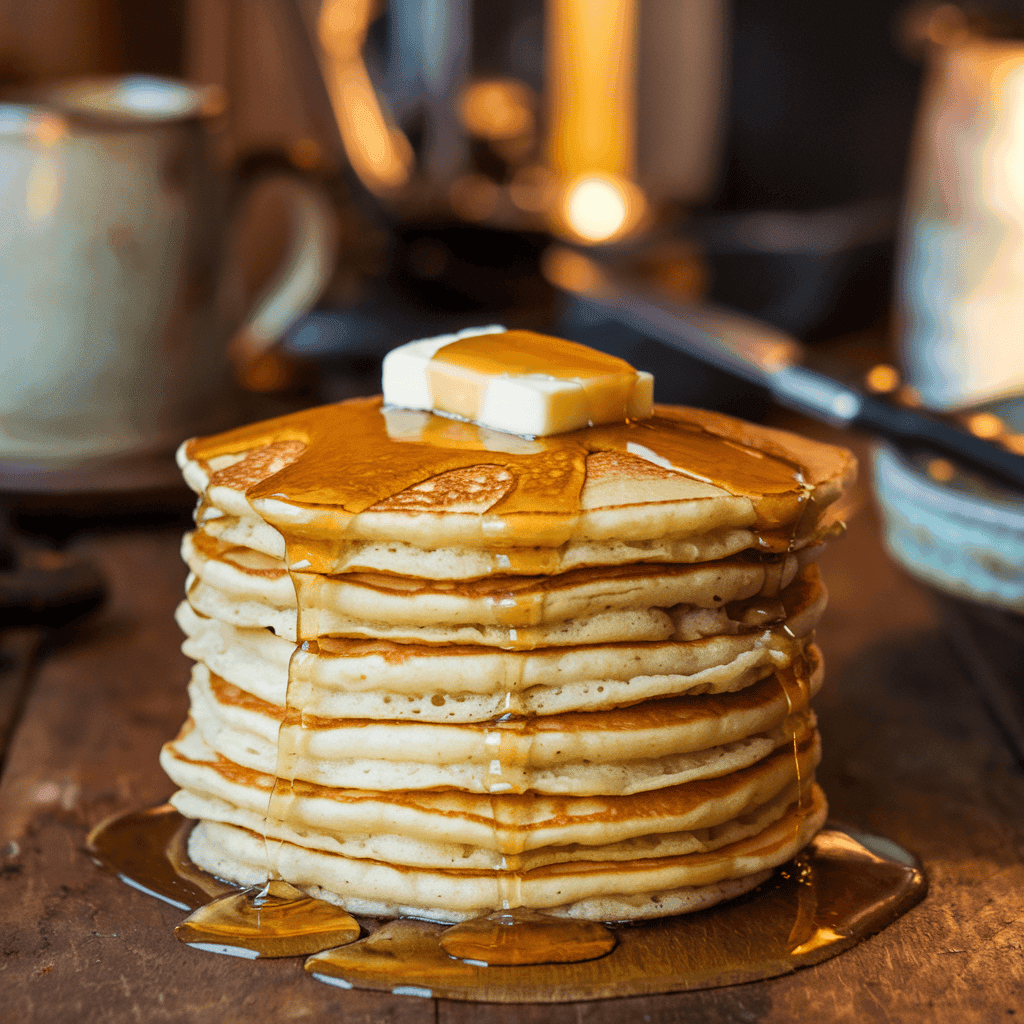Why Do Pancakes Need Eggs? Pancakes are a universally loved breakfast treat. Whether topped with syrup, fruit, or whipped cream, their light and fluffy texture makes them irresistible. But one essential ingredient in most pancake recipes is often overlooked: eggs. Have you ever wondered why eggs are so important in pancake-making? Eggs play a critical role in creating pancakes that are soft, fluffy, and perfectly golden. They provide structure, moisture, and even contribute to the flavor. In this article, we’ll dive deep into the science of why pancakes need eggs, how they affect texture and taste, and what to do if you’re out of eggs or need a substitute. Understanding this simple ingredient can transform your pancake game forever.
Table of contents
The Role of Eggs in Pancakes: Why Do Pancakes Need Eggs?
Eggs are a key ingredient in pancakes because they provide structure, moisture, and richness. Without them, pancakes can become dry, crumbly, or too flat. Here’s how eggs work in pancakes:
1. Eggs as a Binding Agent
Eggs act as a glue that holds pancake ingredients together. When mixed into the batter, their proteins form a network that binds the flour, sugar, and other components. This helps maintain the pancake’s shape during cooking, preventing it from falling apart when flipped.
2. Providing Structure and Texture
Egg proteins coagulate when exposed to heat, giving pancakes structure. This process firms up the batter, creating the signature fluffy and light interior while ensuring the pancakes hold their shape. Without eggs, pancakes can be too soft and fall apart easily.
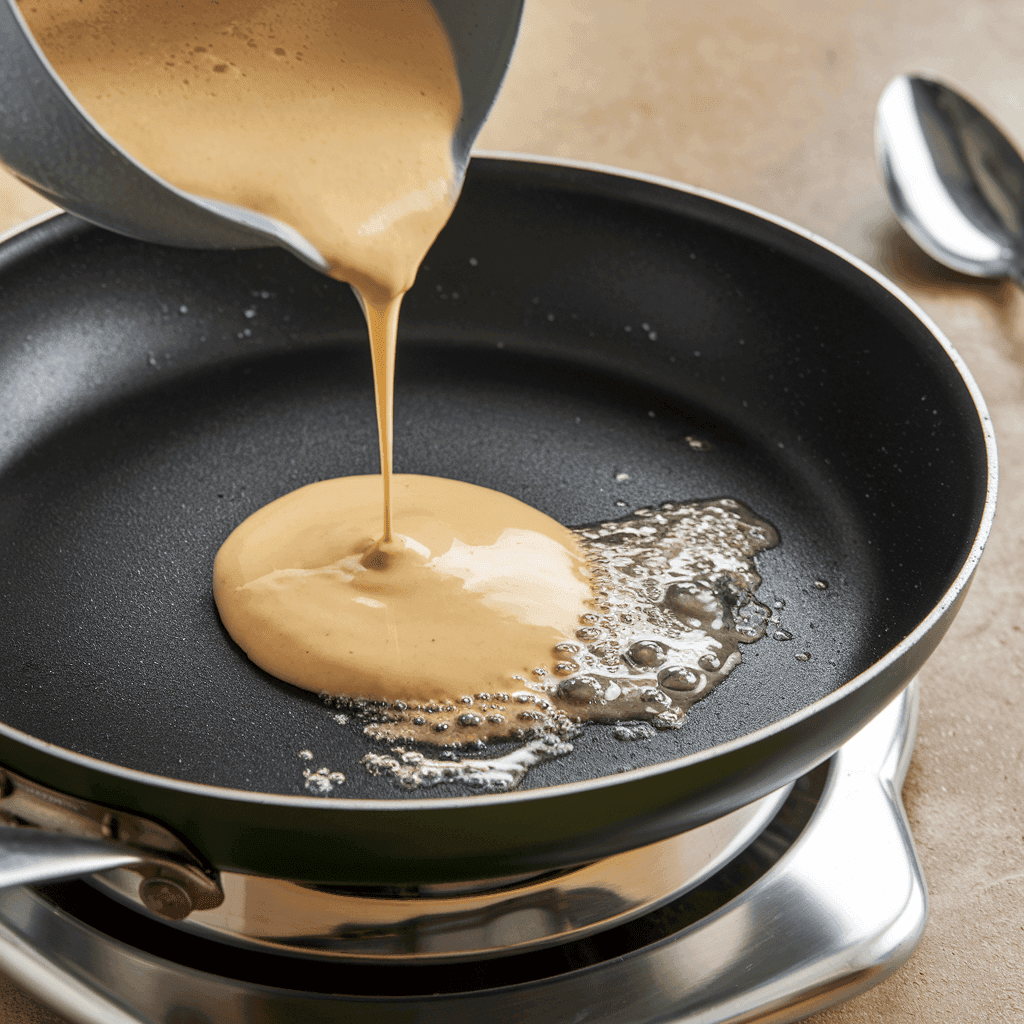
3. Contributing to Pancake Consistency
Eggs help balance pancake consistency by managing both liquid and solid states. The liquid from eggs hydrates the flour, enabling gluten development, while the proteins provide stability. This balance leads to a batter that’s easy to pour but still thick enough to create fluffy pancakes.
4. How Eggs Impact Pancake Thickness
Eggs play a critical role in pancake thickness. Recipes with more eggs often produce thicker pancakes because the additional protein creates a firmer batter. If you want thinner, crepe-like pancakes, reducing the egg content can help.
Key Functions of Eggs in Pancakes: Why Do Pancakes Need Eggs?
Eggs are more than just a basic ingredient; they serve several critical functions that directly affect the quality of pancakes. Let’s explore the key roles eggs play in making pancakes delicious and perfectly cooked:
1. Moisture Retention and Fluffiness
Eggs contain water, which adds necessary moisture to the batter. This moisture prevents pancakes from drying out during cooking. Additionally, the proteins in eggs trap air bubbles when whipped or mixed, contributing to the fluffiness that makes pancakes light and airy.
2. Leavening Effect Through Air Incorporation
While baking powder and baking soda are traditional leavening agents, eggs contribute to leavening as well. When beaten, eggs create air pockets that expand when cooked, helping pancakes rise. This is particularly noticeable when separating egg whites, whipping them to stiff peaks, and folding them into the batter for extra lift.
3. Richness and Flavor Enhancement
Egg yolks are rich in fats and emulsifiers like lecithin, which enhance the overall flavor of pancakes. They create a creamy, tender texture that makes pancakes taste richer and more satisfying. Without eggs, pancakes can taste bland or have a dry, chewy texture.
4. Color and Browning Contribution
Eggs are responsible for the golden-brown appearance of pancakes. In fact, as the batter cooks, the proteins and sugars in eggs undergo the Maillard reaction—a chemical process that produces browning and a delicious, toasty flavor. As a result, this reaction gives pancakes their signature appetizing look and mouthwatering aroma. Moreover, the eggs enhance the overall texture, ensuring that pancakes are not only visually appealing but also rich in flavor.
Egg Substitutes for Pancakes
Sometimes, you might not have eggs on hand or need an alternative due to dietary restrictions. Fortunately, there are several effective egg substitutes that can still produce fluffy and tasty pancakes. Here’s a breakdown of the best egg replacements and how they affect the final result:
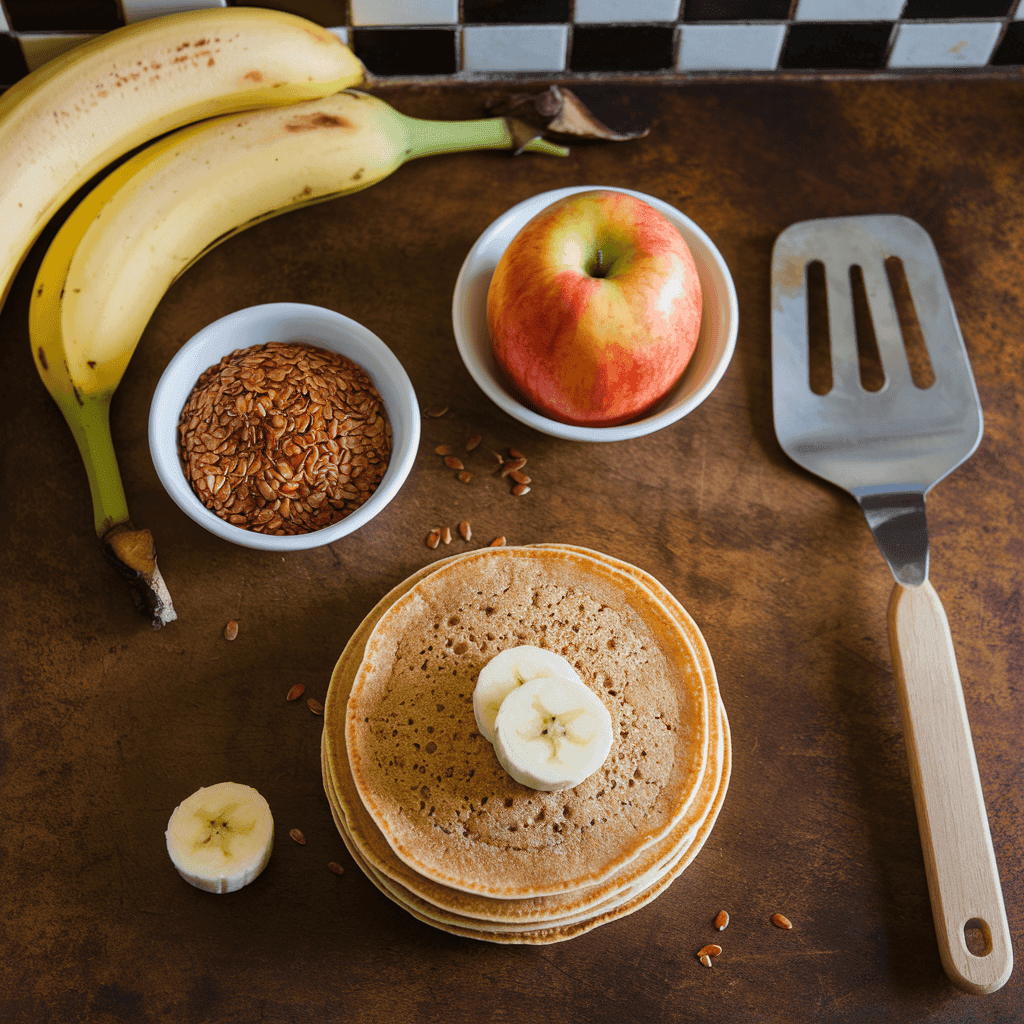
1. Vegan-Friendly Egg Substitutes
a. Flaxseed Meal (Flax Egg)
- How to Use: Mix 1 tablespoon of ground flaxseed with 3 tablespoons of water and let it sit for 5-10 minutes until it forms a gel-like consistency.
- Effect: Provides binding power similar to eggs and adds a slight nutty flavor. Works best for thick, hearty pancakes.
b. Chia Seeds
- How to Use: Mix 1 tablespoon of chia seeds with 3 tablespoons of water and allow it to thicken.
- Effect: Acts as a great binder and adds texture. It’s ideal for health-conscious pancake recipes.
c. Applesauce
- How to Use: Substitute 1/4 cup of unsweetened applesauce for one egg.
- Effect: Adds moisture and a hint of natural sweetness. It works well in light and fruity pancake recipes but may make the batter denser.
2. Allergy-Safe Replacements
a. Mashed Bananas
- How to Use: Use 1/4 cup of mashed banana as a replacement for one egg.
- Effect: Adds moisture and natural sweetness but can result in a denser pancake. Ideal for banana-flavored pancakes.
b. Yogurt (Dairy or Plant-Based)
- How to Use: Replace one egg with 1/4 cup of plain yogurt.
- Effect: Adds moisture, richness, and a slightly tangy taste. It creates a thicker batter perfect for fluffy pancakes.
3. Common Substitute Combinations
a. Baking Powder and Vinegar
- How to Use: Mix 1 tablespoon of baking powder with 1 tablespoon of white vinegar and 2 tablespoons of water.
- Effect: Creates bubbles that mimic the leavening effect of eggs, producing light and airy pancakes.
b. Commercial Egg Replacers
- How to Use: Follow package instructions for powdered egg replacers.
- Effect: Mimics both binding and leavening functions, making it a versatile option for consistent pancake results.
4. How Substitutes Change Pancake Texture
- With Substitutes: Pancakes may be slightly denser, less fluffy, or moister, depending on the chosen substitute.
- Best Practice: Use a combination of substitutes if you want to replicate eggs closely. For example, combine applesauce for moisture with baking powder for leavening.
How to Perfect Pancakes Using Eggs
Eggs are the secret ingredient that can elevate your pancakes from average to extraordinary. Indeed, they play a vital role in creating the perfect balance of fluffiness, moisture, and structure. By applying a few simple techniques, you can significantly improve the texture, appearance, and taste of your pancakes. With that in mind, here’s how to use eggs effectively for the best pancake experience:
1. Choose the Right Type of Eggs
Not all eggs are the same. Selecting high-quality eggs can enhance the taste and nutritional value of your pancakes.
- Fresh Eggs: Use the freshest eggs possible for better flavor and structure.
- Free-Range or Organic Eggs: These eggs often have richer yolks, adding more flavor and color to your pancakes.
- Large Eggs: Most pancake recipes are designed for large eggs. Adjust measurements if using smaller or larger sizes.
2. Separate Egg Whites for Extra Fluffiness
For ultra-fluffy pancakes, try separating the eggs and whipping the whites:
- Step 1: Crack the eggs and separate the yolks from the whites.
- Step 2: Mix the yolks with the wet ingredients in the recipe.
- Step 3: Beat the egg whites until stiff peaks form. Use a hand or stand mixer for efficiency.
- Step 4: Gently fold the whipped egg whites into the pancake batter using a spatula. Avoid overmixing to keep the batter airy.
Why It Works: Beaten egg whites create air pockets that expand during cooking, producing light, cloud-like pancakes.
3. Create the Perfect Pancake Batter
Eggs contribute directly to pancake batter consistency. Here are tips for making the ideal pancake batter:
- Room-Temperature Eggs: Use eggs at room temperature to ensure smooth mixing and better leavening.
- Proper Mixing Technique:
- Beat the eggs lightly before adding them to the wet ingredients.
- Mix wet and dry ingredients separately before combining them.
- Stir just until combined; lumps are fine. Overmixing can create dense pancakes.
4. Cook Pancakes at the Right Temperature
Even with the best egg-enhanced batter, cooking temperature is crucial:
- Preheat the Pan: Use medium heat for even cooking. A too-hot pan will burn the pancakes’ exterior while leaving the inside raw.
- Test the Pan: Sprinkle a few drops of water on the pan; if they sizzle and evaporate quickly, it’s ready.
- Use the Right Amount of Batter: Pour about 1/4 cup of batter per pancake for even cooking.
5. Troubleshooting Pancakes
a. Pancakes Are Too Flat:
- Cause: Not enough eggs or a missing leavening agent.
- Fix: Add an extra egg or a pinch of baking powder.
b. Pancakes Are Too Dense:
- Cause: Overmixing the batter or too many eggs.
- Fix: Mix the batter gently and reduce the number of eggs if using other moist ingredients like yogurt.
c. Pancakes Are Dry:
- Cause: Overcooking or too little liquid.
- Fix: Cook on moderate heat and adjust the liquid content in the batter.
6. Enhancing Flavor with Eggs
Eggs can also be used to enhance pancake flavor by incorporating extra ingredients into the batter:
- Vanilla Extract: A splash of vanilla can complement the egg flavor.
- Cinnamon or Nutmeg: Add a pinch of spices for warmth and depth.
- Buttermilk: Use buttermilk instead of regular milk to add tang and moisture, working well with the eggs’ richness.
Common Pancake Mistakes Related to Eggs
Eggs play a crucial role in pancake-making, but improper use can result in disappointing pancakes. Let’s explore common egg-related mistakes and how to avoid them:
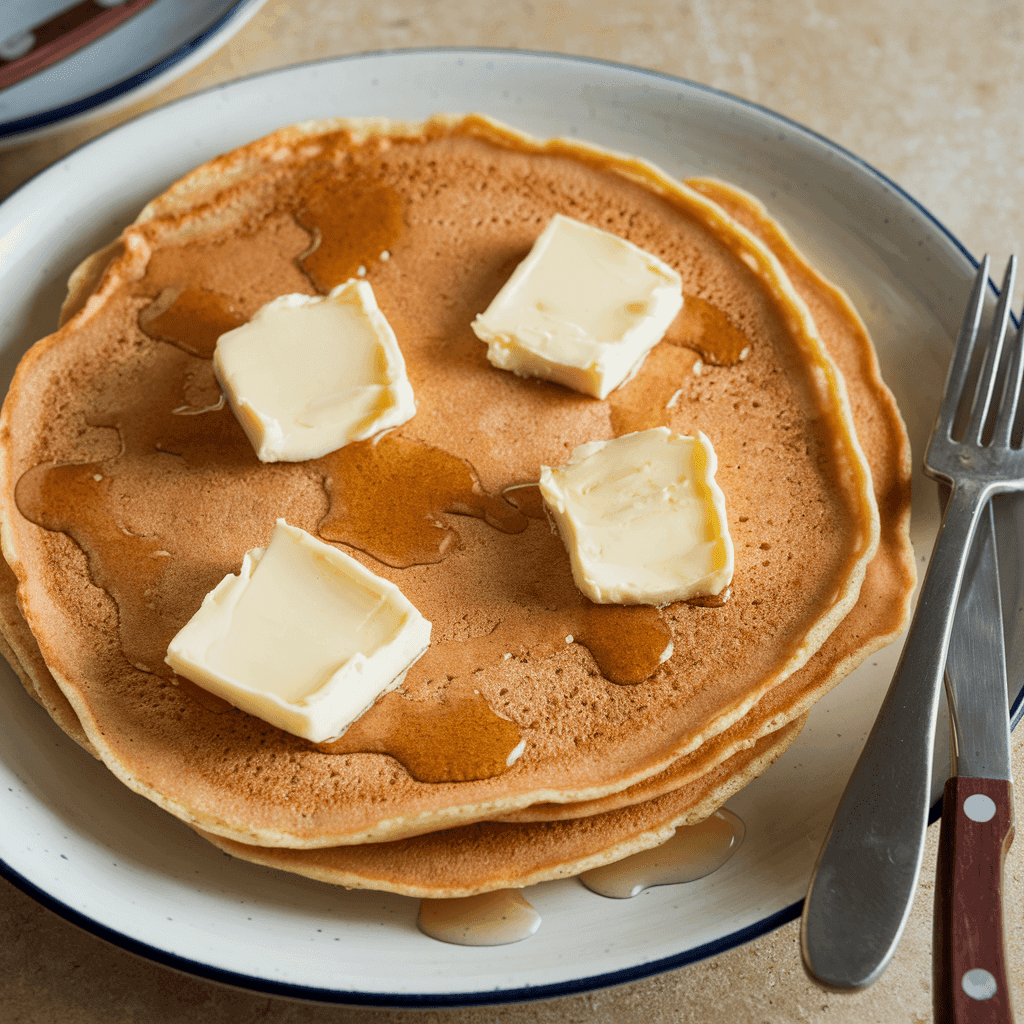
1. Overusing Eggs
What Happens:
- Adding too many eggs can make pancakes dense, rubbery, and overly moist.
- The batter becomes heavy, preventing pancakes from rising properly.
How to Fix It:
- Stick to the recipe’s recommended egg quantity. A standard ratio is one egg per cup of flour.
- If experimenting, reduce eggs when adding extra wet ingredients like yogurt or fruit purées.
2. Underusing Eggs
What Happens:
- Pancakes become flat, crumbly, and prone to falling apart.
- Without eggs, the batter lacks the structure needed for fluffy pancakes.
How to Fix It:
- Ensure at least one egg is used per pancake batch, or replace it with a proper egg substitute.
3. Improper Mixing of Eggs
What Happens:
- Overmixing the batter can create tough pancakes due to gluten overdevelopment.
- Undermixing may leave streaks of egg, causing uneven cooking and taste.
How to Fix It:
- Beat eggs separately before adding them to the batter for better incorporation.
- Mix the batter just until combined; lumps are okay for tender pancakes.
4. Using Cold Eggs
What Happens:
- Cold eggs can cause uneven mixing, leading to inconsistent texture.
- Pancakes may cook unevenly and be less fluffy.
How to Fix It:
- Use eggs at room temperature. Let them sit out for 30 minutes before mixing.
5. Skipping the Beating Step
What Happens:
- Skipping the step of beating eggs leads to flat, dense pancakes.
- Beaten eggs incorporate air, making the pancakes rise higher.
How to Fix It:
- Lightly whisk the eggs before adding them to the batter to improve fluffiness.
- For extra height, separate the egg whites, beat them until stiff peaks form, and fold them into the batter at the end.
6. Using Expired Eggs
What Happens:
- Expired eggs can cause a strange taste and reduce pancake quality.
- Pancakes may not rise properly if the eggs are past their prime.
How to Fix It:
- Always check the expiration date before using eggs. Perform the float test by placing an egg in water; if it sinks, it’s fresh.
FAQs About Eggs in Pancakes
To wrap up our deep dive into why pancakes need eggs, here are answers to frequently asked questions about eggs in pancake-making:
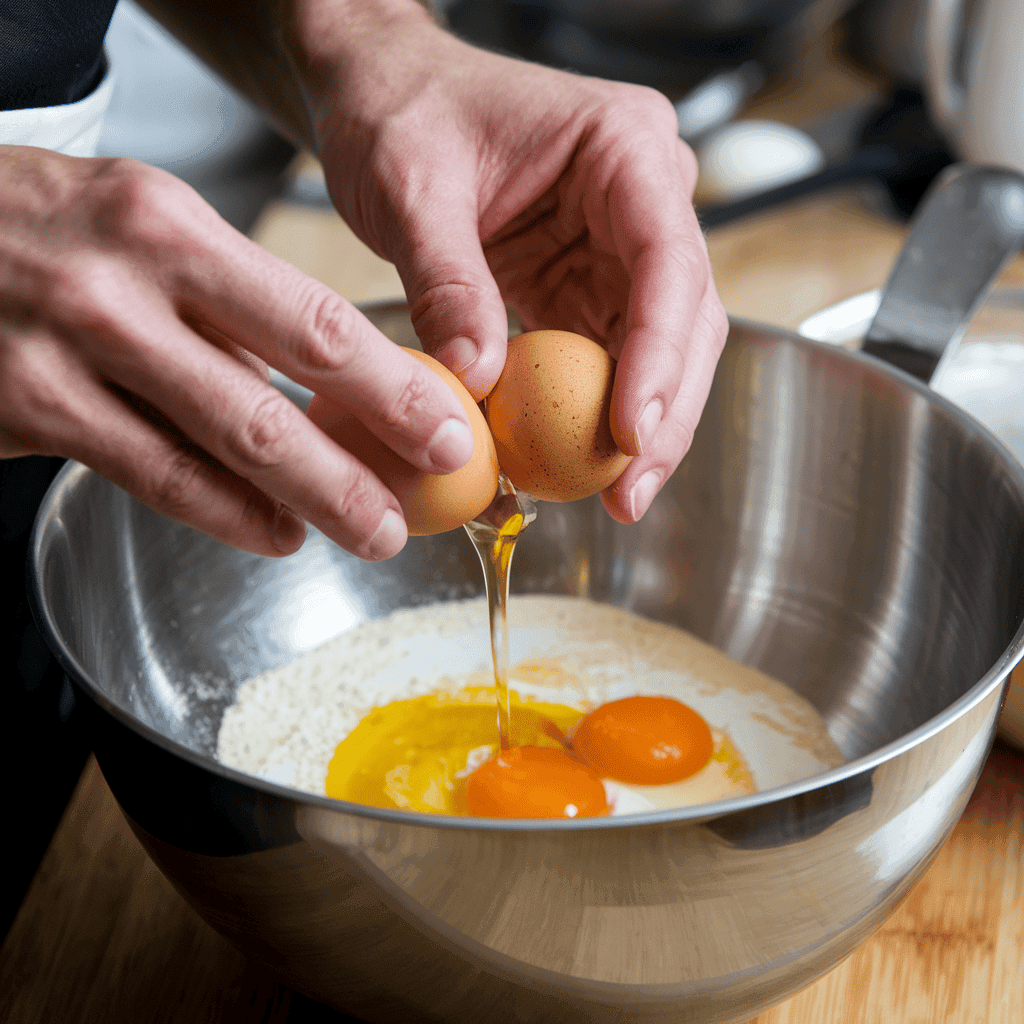
1. How Many Eggs Should You Use in Pancakes?
The typical pancake recipe uses one egg per cup of flour. This ratio balances structure and moisture. For fluffier pancakes, consider adding an extra egg or separating and whipping the egg whites before folding them into the batter.
2. Can You Make Pancakes Without Eggs?
Yes! Pancakes can be made without eggs by using substitutes such as:
- Flax eggs (1 tbsp flaxseed + 3 tbsp water)
- Applesauce (1/4 cup per egg)
- Mashed bananas (1/4 cup per egg)
- Baking powder and vinegar (1 tbsp each)
These alternatives work well, though the texture may differ slightly.
3. What’s the Best Egg Substitute for Pancakes?
The best egg substitute depends on the desired pancake texture:
- For binding: Flax eggs or chia seeds.
- For moisture and softness: Applesauce or mashed bananas.
- For fluffiness: Baking powder and vinegar or a commercial egg replacer.
4. Are Eggs Necessary for Fluffy Pancakes?
While eggs are helpful, they aren’t strictly necessary for fluffy pancakes. You can create light pancakes by:
- Increasing baking powder or baking soda.
- Adding whipped egg substitutes like aquafaba (chickpea liquid).
- Separating egg whites, beating them, and folding them into the batter.
5. Do Eggs Affect Pancake Nutrition?
Yes, eggs provide important nutrients, including:
- Protein: Helps with muscle repair.
- Vitamins: Eggs are rich in vitamin B12, essential for energy.
- Healthy Fats: Found in egg yolks, these add richness and satiety.
If you’re watching cholesterol, consider using egg whites or egg substitutes.
6. Can You Freeze Pancakes Made with Eggs?
Yes, pancakes made with eggs freeze well. Let them cool completely before placing them in an airtight container or freezer bag. Reheat them in a toaster or oven for a quick breakfast.
Conclusion
Eggs are a vital ingredient in pancake recipes, offering structure, moisture, leavening, and flavor. They ensure pancakes rise well, taste delicious, and look golden-brown. However, if you’re out of eggs or have dietary restrictions, numerous substitutes can still yield tasty results. By understanding how eggs work in pancakes, you can easily adjust recipes for perfect pancakes every time.

